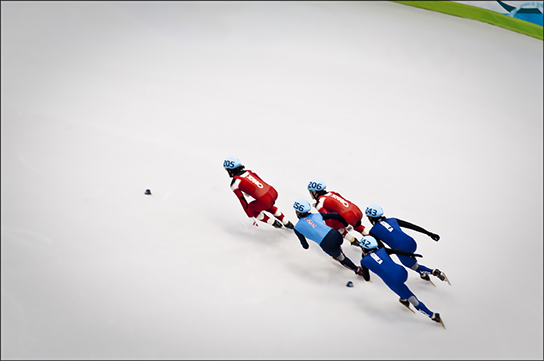Print Edition: September 11, 2013
I’m sure everyone has heard about the anti-gay legislation that was passed in Russia a few months ago. This is particularly interesting in light of the upcoming Winter Olympics in Sochi, Russia, especially from an athlete’s perspective.
The Olympics have always been a huge deal to me because I was a highly competitive athlete for over 14 years. I grew up short track speed-skating, worked my way up to earn a spot on the provincial racing team, and competed at multiple BC Winter Games, as well as provincial, national, and North American championships.
When I first heard about Russia’s anti-gay laws, it was through an article I found circulating in the short track speed-skating community about one of our own athletes, Olympic hopeful Blake Skjellerup. Skjellerup is from New Zealand and currently trains in Calgary alongside a number of athletes I’ve known for years and have competed against, which brought the issue that much closer to home for me.
In an interview for the Windy City Times, Blake told reporter Ross Forman that “being in the closet was not a very fun time for me … I’m not going to change who I am because one country sees that who I am is wrong.” He also confirmed that he will wear an official Olympic pride pin in Sochi, stating that “if I can do my part (by showing support), even if just for one person in Sochi, then I will be very happy.” Blake further stated that he is 100 per cent against boycotting the Games because “I think it’s much more important for there to be a very strong presence in Sochi” to support human rights and ultimately diversity.
On the athlete side of things, what I loved most about my time in short track was that everyone left their beliefs, politics, and issues at the door. On the ice, none of that mattered. Your sex didn’t matter, which is probably why we were one of the few sports to use co-ed dressing rooms. Your age didn’t matter. Your religion didn’t matter. Your sexual orientation sure as hell didn’t matter. And that was the beauty of it; we were there to skate, have a good time, and hopefully win some races. That was it.
I noticed over the years that as the level of competition gets higher, this still holds true. National championships don’t discriminate against age, gender, or province. The emphasis is on the hard work, time, and dedication that everyone puts in to get to that level of competition. The Olympics are essentially the same thing, only on an international scale.
That’s the whole point. The Olympics are supposed to be a time and place where acceptance is celebrated in the realm of sport. Which is exactly what the International Olympic Committee (IOC) also claims.
Frankly, Russia, that’s your own bag if you choose not to support gay rights. No one is stopping you. But that doesn’t give you the right to force those values on the Olympics.
The Games are about acceptance and celebrating success in sport. In order for this to happen, any place that chooses to host the Games needs to temporarily suspend its beliefs and values for the purpose and duration of the Games so that everyone is treated equally. This is the same thing we do in academia for critical analysis – we temporarily suspend our beliefs. It’s nothing personal, and it’s likely not going to change our worldview. But everyone and everything is treated equally and objectively, not based on our own preconceptions. At the very least, it’s fair.



